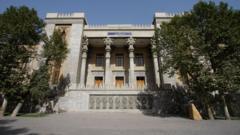In preparation for crucial elections, Farage’s Reform U.K. party has caught the public's attention with its ascendant polling figures, positioning itself against traditional parties.
**Nigel Farage's Political Revival: Can He Succeed with American-Style Rallies in the UK?**

**Nigel Farage's Political Revival: Can He Succeed with American-Style Rallies in the UK?**
As local elections approach, Farage aims to leverage his party's rising popularity through energized rallies reminiscent of Trump's campaign style.
In an electrifying atmosphere marked by pulsating beats and radiant light displays, Nigel Farage, the controversial figure leading the right-wing populist party Reform U.K., captivated audiences during his recent rally in Birmingham. Riding onto the stage on a backhoe, this tabloid-sensational leader has rekindled the concept of political rallies in the UK, inspired by the audacious campaign strategies of his associate, former President Donald Trump.
Farage, known for his staunch anti-immigration stance, has been traversing England leading up to local elections set for May 1, focusing his rhetoric on the promise to deport "illegal immigrants." The resurgence of his party follows his return to leadership and a successful first election campaign that has propelled Reform U.K. to a significant 25% polling average, eclipsing the traditional opposition Conservatives and occasionally surpassing the ruling Labour Party.
While the impending elections involve only a handful of seats, they serve as a critical barometer for Reform's capacity to transition its polling prowess into tangible victories. Political analysts predict that Farage's party could clinch hundreds of municipal seats along with two influential regional mayoral positions. There's heightened excitement as Reform is also deemed likely to secure a competitive parliamentary seat during the special election occurring on the same night.
This political surge suggests Farage's strategies, blending populist appeal with visually engaging rallies, could signal a shift in the UK political landscape, potentially reshaping the dynamics leading into future electoral contests.





















